Psychology Assignment: Multi-Store Model, Memory Types, and Theories
VerifiedAdded on 2022/08/27
|11
|2128
|24
Homework Assignment
AI Summary
This psychology assignment explores the multi-store memory model, including its structure, strengths, and weaknesses. It details the three memory stores: sensory register, short-term memory, and long-term memory, explaining how information moves between them. The assignment then defines and provides personal examples of different types of memory, such as procedural, declarative, semantic, and episodic memory. Furthermore, it examines the theory of interference, differentiating between retroactive and proactive interference and also delves into the decay theory of forgetting, retrieval failure theory, and cue-dependent theory, providing a comprehensive overview of memory and forgetting processes. The assignment concludes with an analysis of how these theories relate to real-world scenarios, specifically in the context of eyewitness testimony.
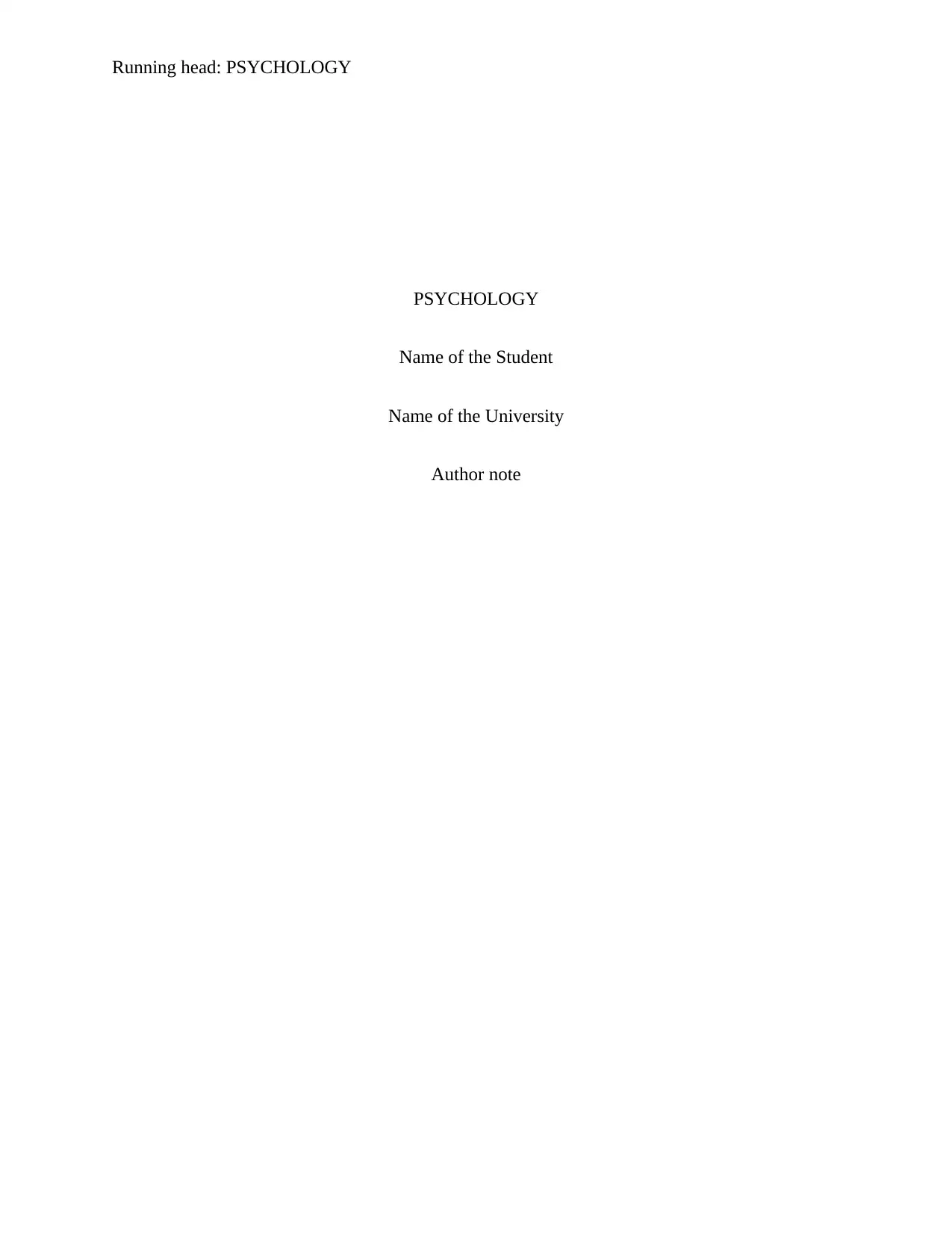
Running head: PSYCHOLOGY
PSYCHOLOGY
Name of the Student
Name of the University
Author note
PSYCHOLOGY
Name of the Student
Name of the University
Author note
Paraphrase This Document
Need a fresh take? Get an instant paraphrase of this document with our AI Paraphraser
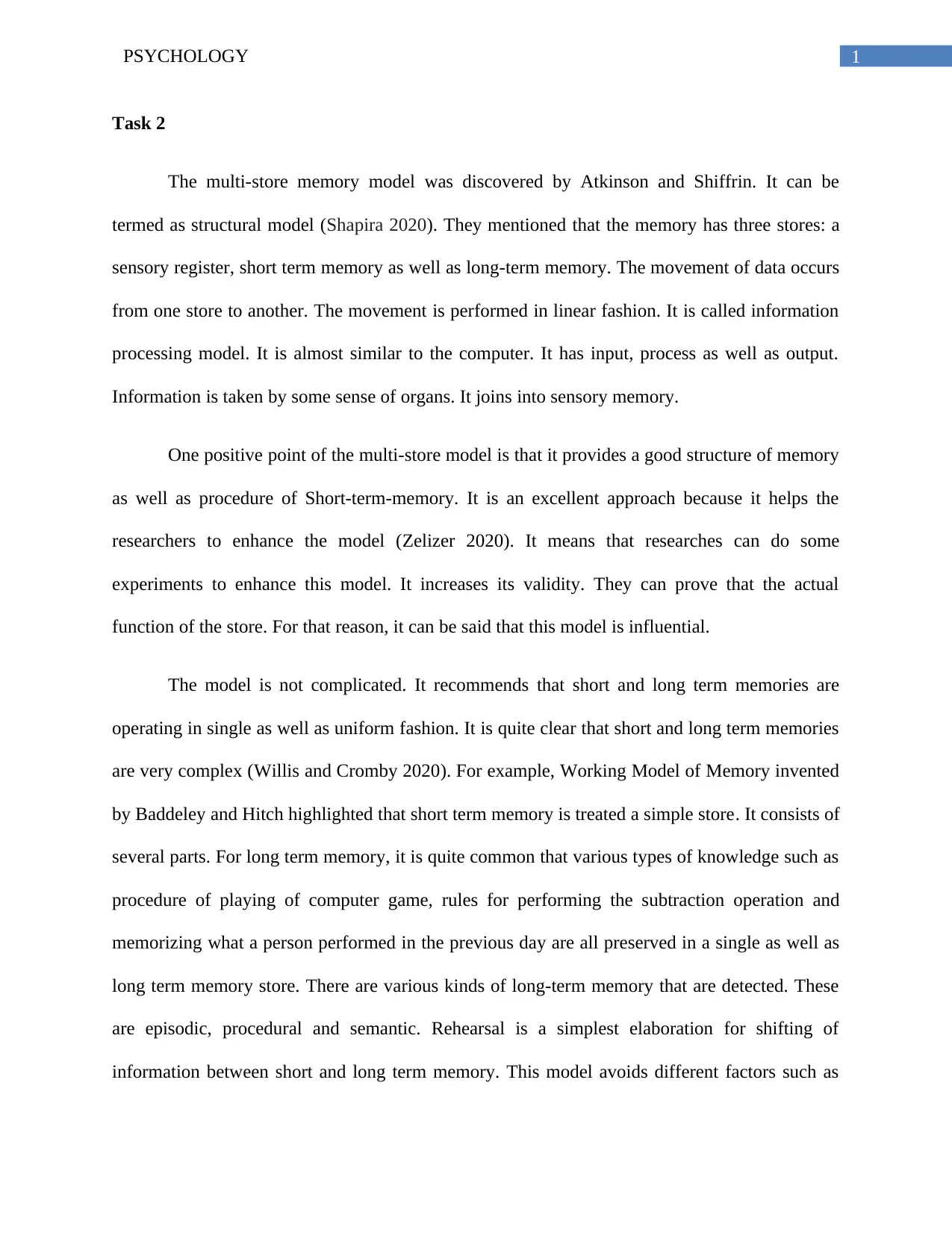
1PSYCHOLOGY
Task 2
The multi-store memory model was discovered by Atkinson and Shiffrin. It can be
termed as structural model (Shapira 2020). They mentioned that the memory has three stores: a
sensory register, short term memory as well as long-term memory. The movement of data occurs
from one store to another. The movement is performed in linear fashion. It is called information
processing model. It is almost similar to the computer. It has input, process as well as output.
Information is taken by some sense of organs. It joins into sensory memory.
One positive point of the multi-store model is that it provides a good structure of memory
as well as procedure of Short-term-memory. It is an excellent approach because it helps the
researchers to enhance the model (Zelizer 2020). It means that researches can do some
experiments to enhance this model. It increases its validity. They can prove that the actual
function of the store. For that reason, it can be said that this model is influential.
The model is not complicated. It recommends that short and long term memories are
operating in single as well as uniform fashion. It is quite clear that short and long term memories
are very complex (Willis and Cromby 2020). For example, Working Model of Memory invented
by Baddeley and Hitch highlighted that short term memory is treated a simple store. It consists of
several parts. For long term memory, it is quite common that various types of knowledge such as
procedure of playing of computer game, rules for performing the subtraction operation and
memorizing what a person performed in the previous day are all preserved in a single as well as
long term memory store. There are various kinds of long-term memory that are detected. These
are episodic, procedural and semantic. Rehearsal is a simplest elaboration for shifting of
information between short and long term memory. This model avoids different factors such as
Task 2
The multi-store memory model was discovered by Atkinson and Shiffrin. It can be
termed as structural model (Shapira 2020). They mentioned that the memory has three stores: a
sensory register, short term memory as well as long-term memory. The movement of data occurs
from one store to another. The movement is performed in linear fashion. It is called information
processing model. It is almost similar to the computer. It has input, process as well as output.
Information is taken by some sense of organs. It joins into sensory memory.
One positive point of the multi-store model is that it provides a good structure of memory
as well as procedure of Short-term-memory. It is an excellent approach because it helps the
researchers to enhance the model (Zelizer 2020). It means that researches can do some
experiments to enhance this model. It increases its validity. They can prove that the actual
function of the store. For that reason, it can be said that this model is influential.
The model is not complicated. It recommends that short and long term memories are
operating in single as well as uniform fashion. It is quite clear that short and long term memories
are very complex (Willis and Cromby 2020). For example, Working Model of Memory invented
by Baddeley and Hitch highlighted that short term memory is treated a simple store. It consists of
several parts. For long term memory, it is quite common that various types of knowledge such as
procedure of playing of computer game, rules for performing the subtraction operation and
memorizing what a person performed in the previous day are all preserved in a single as well as
long term memory store. There are various kinds of long-term memory that are detected. These
are episodic, procedural and semantic. Rehearsal is a simplest elaboration for shifting of
information between short and long term memory. This model avoids different factors such as
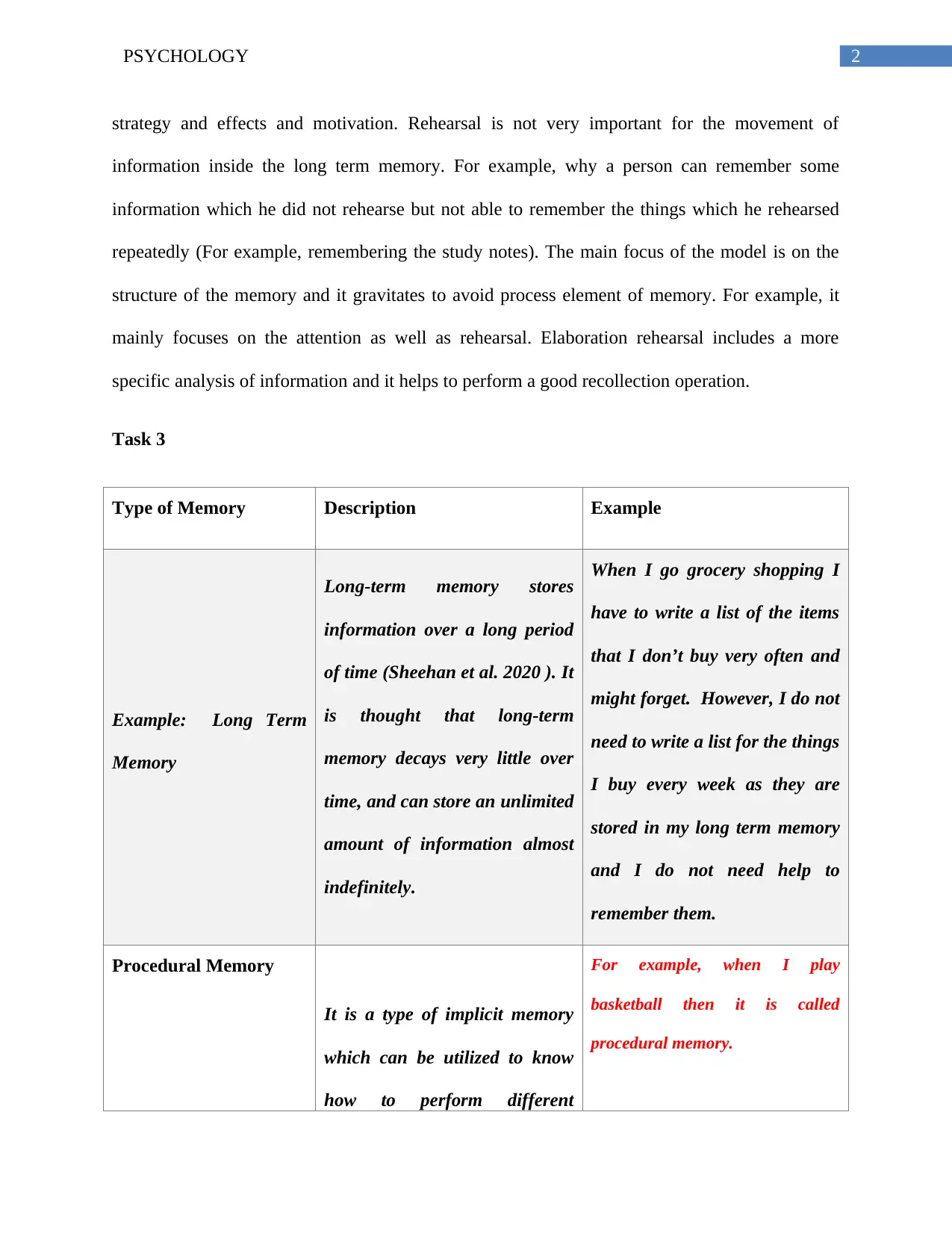
2PSYCHOLOGY
strategy and effects and motivation. Rehearsal is not very important for the movement of
information inside the long term memory. For example, why a person can remember some
information which he did not rehearse but not able to remember the things which he rehearsed
repeatedly (For example, remembering the study notes). The main focus of the model is on the
structure of the memory and it gravitates to avoid process element of memory. For example, it
mainly focuses on the attention as well as rehearsal. Elaboration rehearsal includes a more
specific analysis of information and it helps to perform a good recollection operation.
Task 3
Type of Memory Description Example
Example: Long Term
Memory
Long-term memory stores
information over a long period
of time (Sheehan et al. 2020 ). It
is thought that long-term
memory decays very little over
time, and can store an unlimited
amount of information almost
indefinitely.
When I go grocery shopping I
have to write a list of the items
that I don’t buy very often and
might forget. However, I do not
need to write a list for the things
I buy every week as they are
stored in my long term memory
and I do not need help to
remember them.
Procedural Memory
It is a type of implicit memory
which can be utilized to know
how to perform different
For example, when I play
basketball then it is called
procedural memory.
strategy and effects and motivation. Rehearsal is not very important for the movement of
information inside the long term memory. For example, why a person can remember some
information which he did not rehearse but not able to remember the things which he rehearsed
repeatedly (For example, remembering the study notes). The main focus of the model is on the
structure of the memory and it gravitates to avoid process element of memory. For example, it
mainly focuses on the attention as well as rehearsal. Elaboration rehearsal includes a more
specific analysis of information and it helps to perform a good recollection operation.
Task 3
Type of Memory Description Example
Example: Long Term
Memory
Long-term memory stores
information over a long period
of time (Sheehan et al. 2020 ). It
is thought that long-term
memory decays very little over
time, and can store an unlimited
amount of information almost
indefinitely.
When I go grocery shopping I
have to write a list of the items
that I don’t buy very often and
might forget. However, I do not
need to write a list for the things
I buy every week as they are
stored in my long term memory
and I do not need help to
remember them.
Procedural Memory
It is a type of implicit memory
which can be utilized to know
how to perform different
For example, when I play
basketball then it is called
procedural memory.
⊘ This is a preview!⊘
Do you want full access?
Subscribe today to unlock all pages.

Trusted by 1+ million students worldwide
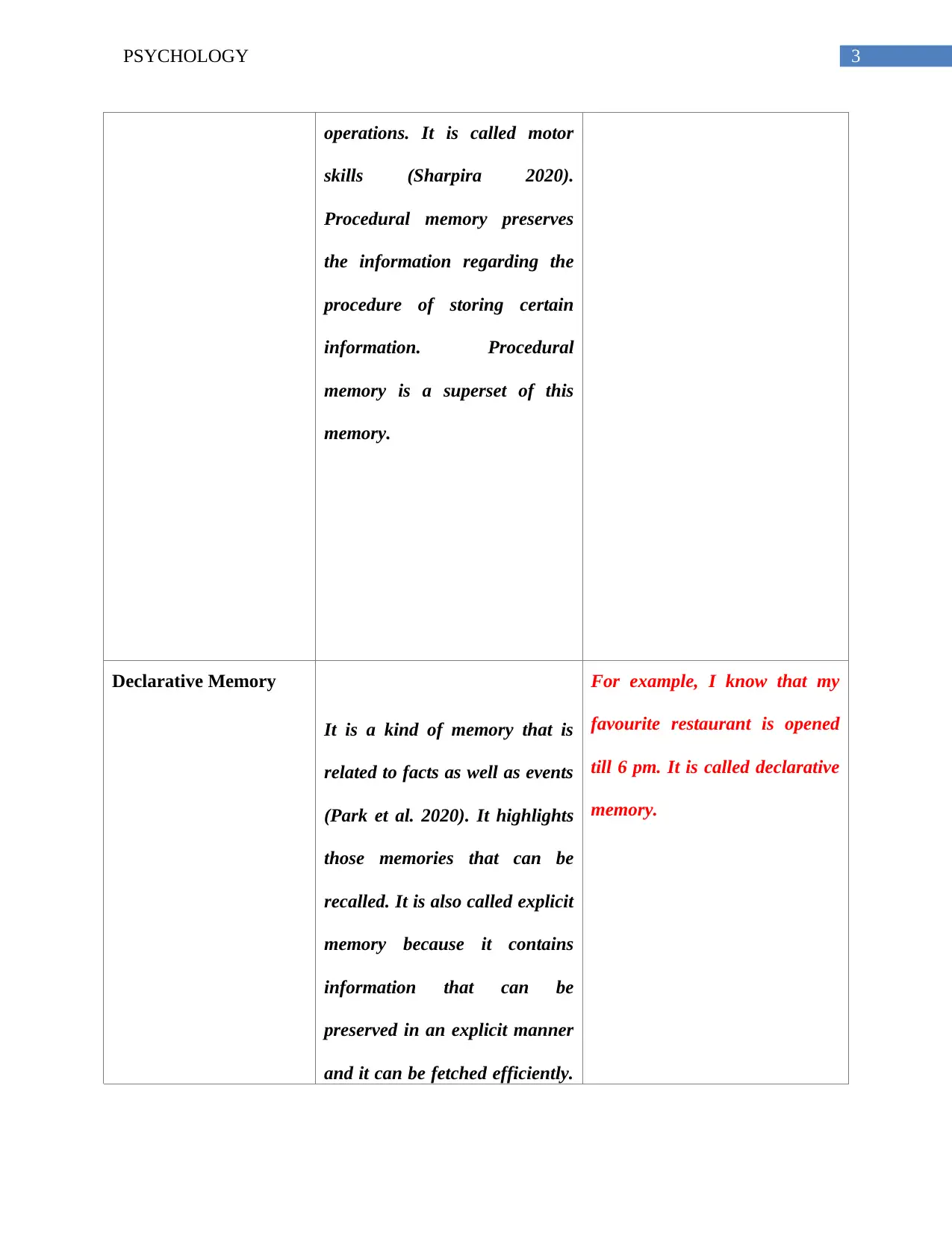
3PSYCHOLOGY
operations. It is called motor
skills (Sharpira 2020).
Procedural memory preserves
the information regarding the
procedure of storing certain
information. Procedural
memory is a superset of this
memory.
Declarative Memory
It is a kind of memory that is
related to facts as well as events
(Park et al. 2020). It highlights
those memories that can be
recalled. It is also called explicit
memory because it contains
information that can be
preserved in an explicit manner
and it can be fetched efficiently.
For example, I know that my
favourite restaurant is opened
till 6 pm. It is called declarative
memory.
operations. It is called motor
skills (Sharpira 2020).
Procedural memory preserves
the information regarding the
procedure of storing certain
information. Procedural
memory is a superset of this
memory.
Declarative Memory
It is a kind of memory that is
related to facts as well as events
(Park et al. 2020). It highlights
those memories that can be
recalled. It is also called explicit
memory because it contains
information that can be
preserved in an explicit manner
and it can be fetched efficiently.
For example, I know that my
favourite restaurant is opened
till 6 pm. It is called declarative
memory.
Paraphrase This Document
Need a fresh take? Get an instant paraphrase of this document with our AI Paraphraser
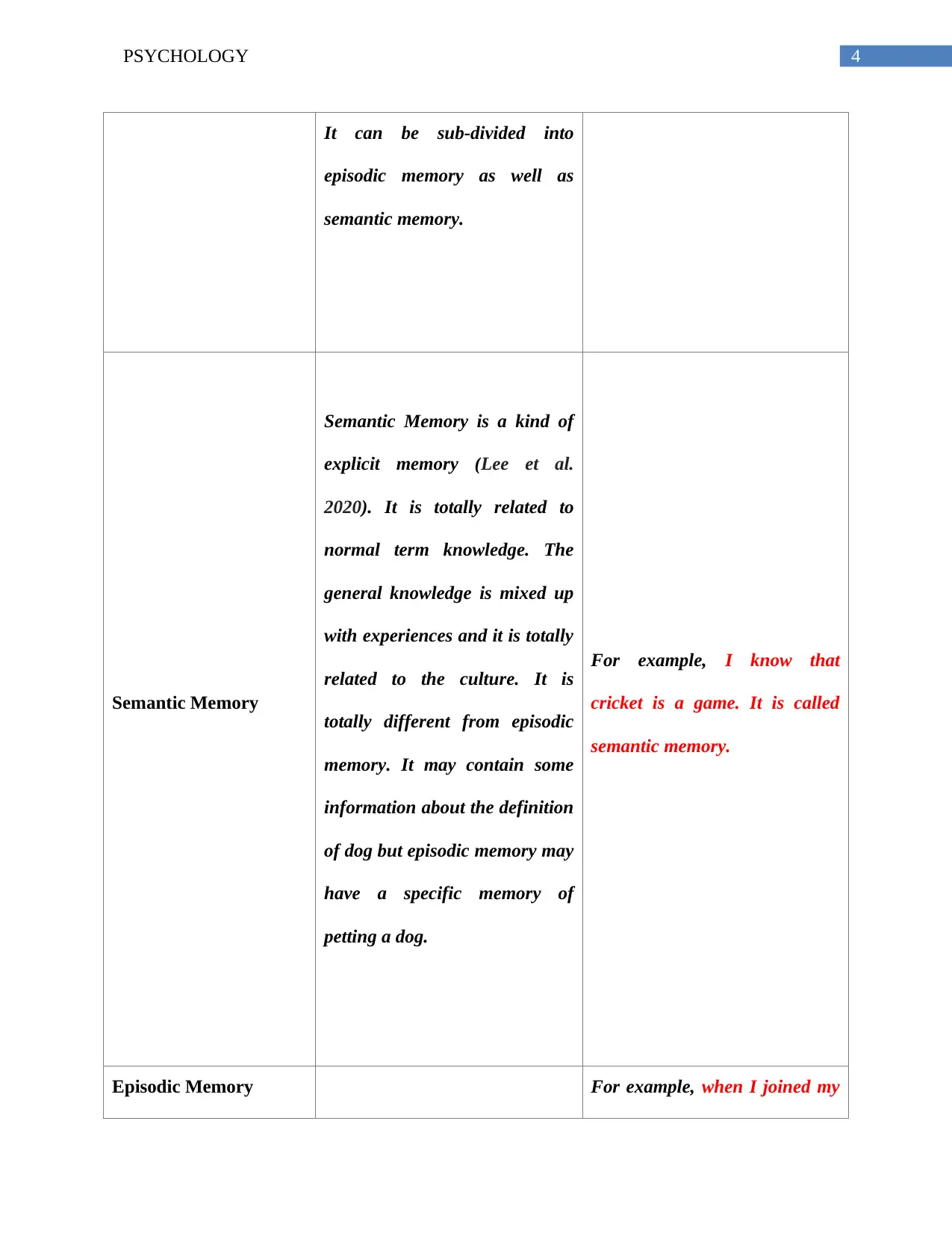
4PSYCHOLOGY
It can be sub-divided into
episodic memory as well as
semantic memory.
Semantic Memory
Semantic Memory is a kind of
explicit memory (Lee et al.
2020). It is totally related to
normal term knowledge. The
general knowledge is mixed up
with experiences and it is totally
related to the culture. It is
totally different from episodic
memory. It may contain some
information about the definition
of dog but episodic memory may
have a specific memory of
petting a dog.
For example, I know that
cricket is a game. It is called
semantic memory.
Episodic Memory For example, when I joined my
It can be sub-divided into
episodic memory as well as
semantic memory.
Semantic Memory
Semantic Memory is a kind of
explicit memory (Lee et al.
2020). It is totally related to
normal term knowledge. The
general knowledge is mixed up
with experiences and it is totally
related to the culture. It is
totally different from episodic
memory. It may contain some
information about the definition
of dog but episodic memory may
have a specific memory of
petting a dog.
For example, I know that
cricket is a game. It is called
semantic memory.
Episodic Memory For example, when I joined my
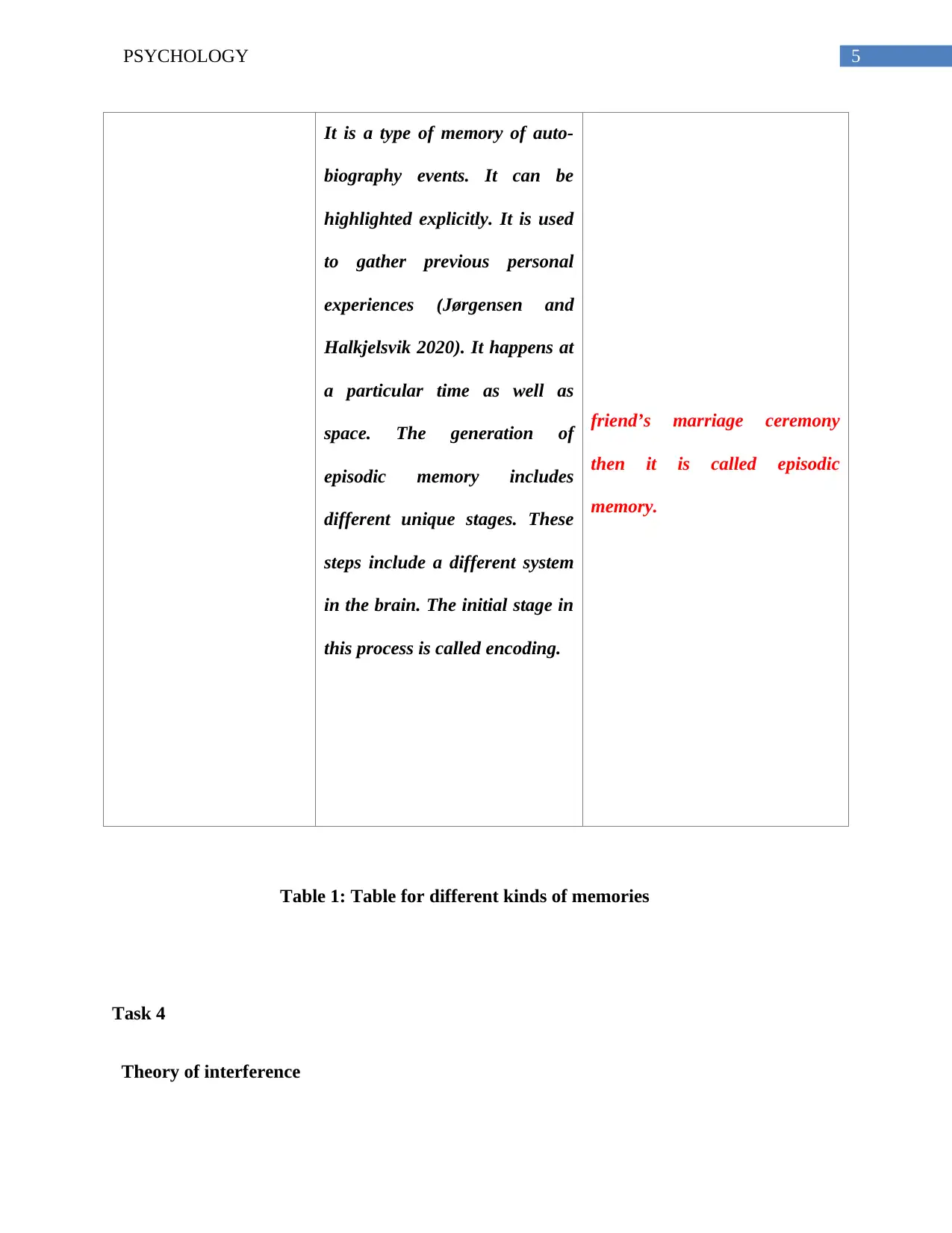
5PSYCHOLOGY
It is a type of memory of auto-
biography events. It can be
highlighted explicitly. It is used
to gather previous personal
experiences (Jørgensen and
Halkjelsvik 2020). It happens at
a particular time as well as
space. The generation of
episodic memory includes
different unique stages. These
steps include a different system
in the brain. The initial stage in
this process is called encoding.
friend’s marriage ceremony
then it is called episodic
memory.
Table 1: Table for different kinds of memories
Task 4
Theory of interference
It is a type of memory of auto-
biography events. It can be
highlighted explicitly. It is used
to gather previous personal
experiences (Jørgensen and
Halkjelsvik 2020). It happens at
a particular time as well as
space. The generation of
episodic memory includes
different unique stages. These
steps include a different system
in the brain. The initial stage in
this process is called encoding.
friend’s marriage ceremony
then it is called episodic
memory.
Table 1: Table for different kinds of memories
Task 4
Theory of interference
⊘ This is a preview!⊘
Do you want full access?
Subscribe today to unlock all pages.

Trusted by 1+ million students worldwide
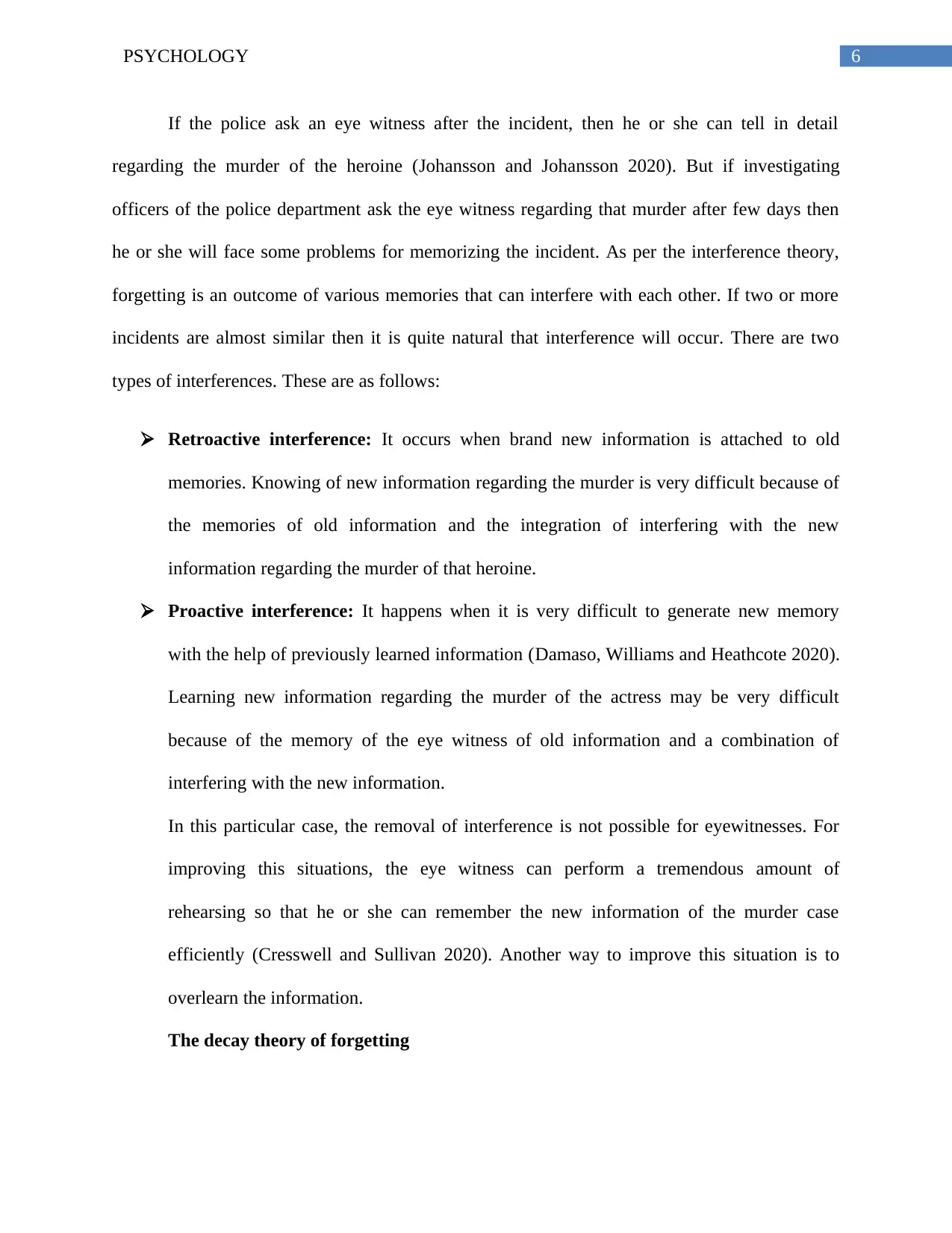
6PSYCHOLOGY
If the police ask an eye witness after the incident, then he or she can tell in detail
regarding the murder of the heroine (Johansson and Johansson 2020). But if investigating
officers of the police department ask the eye witness regarding that murder after few days then
he or she will face some problems for memorizing the incident. As per the interference theory,
forgetting is an outcome of various memories that can interfere with each other. If two or more
incidents are almost similar then it is quite natural that interference will occur. There are two
types of interferences. These are as follows:
Retroactive interference: It occurs when brand new information is attached to old
memories. Knowing of new information regarding the murder is very difficult because of
the memories of old information and the integration of interfering with the new
information regarding the murder of that heroine.
Proactive interference: It happens when it is very difficult to generate new memory
with the help of previously learned information (Damaso, Williams and Heathcote 2020).
Learning new information regarding the murder of the actress may be very difficult
because of the memory of the eye witness of old information and a combination of
interfering with the new information.
In this particular case, the removal of interference is not possible for eyewitnesses. For
improving this situations, the eye witness can perform a tremendous amount of
rehearsing so that he or she can remember the new information of the murder case
efficiently (Cresswell and Sullivan 2020). Another way to improve this situation is to
overlearn the information.
The decay theory of forgetting
If the police ask an eye witness after the incident, then he or she can tell in detail
regarding the murder of the heroine (Johansson and Johansson 2020). But if investigating
officers of the police department ask the eye witness regarding that murder after few days then
he or she will face some problems for memorizing the incident. As per the interference theory,
forgetting is an outcome of various memories that can interfere with each other. If two or more
incidents are almost similar then it is quite natural that interference will occur. There are two
types of interferences. These are as follows:
Retroactive interference: It occurs when brand new information is attached to old
memories. Knowing of new information regarding the murder is very difficult because of
the memories of old information and the integration of interfering with the new
information regarding the murder of that heroine.
Proactive interference: It happens when it is very difficult to generate new memory
with the help of previously learned information (Damaso, Williams and Heathcote 2020).
Learning new information regarding the murder of the actress may be very difficult
because of the memory of the eye witness of old information and a combination of
interfering with the new information.
In this particular case, the removal of interference is not possible for eyewitnesses. For
improving this situations, the eye witness can perform a tremendous amount of
rehearsing so that he or she can remember the new information of the murder case
efficiently (Cresswell and Sullivan 2020). Another way to improve this situation is to
overlearn the information.
The decay theory of forgetting
Paraphrase This Document
Need a fresh take? Get an instant paraphrase of this document with our AI Paraphraser
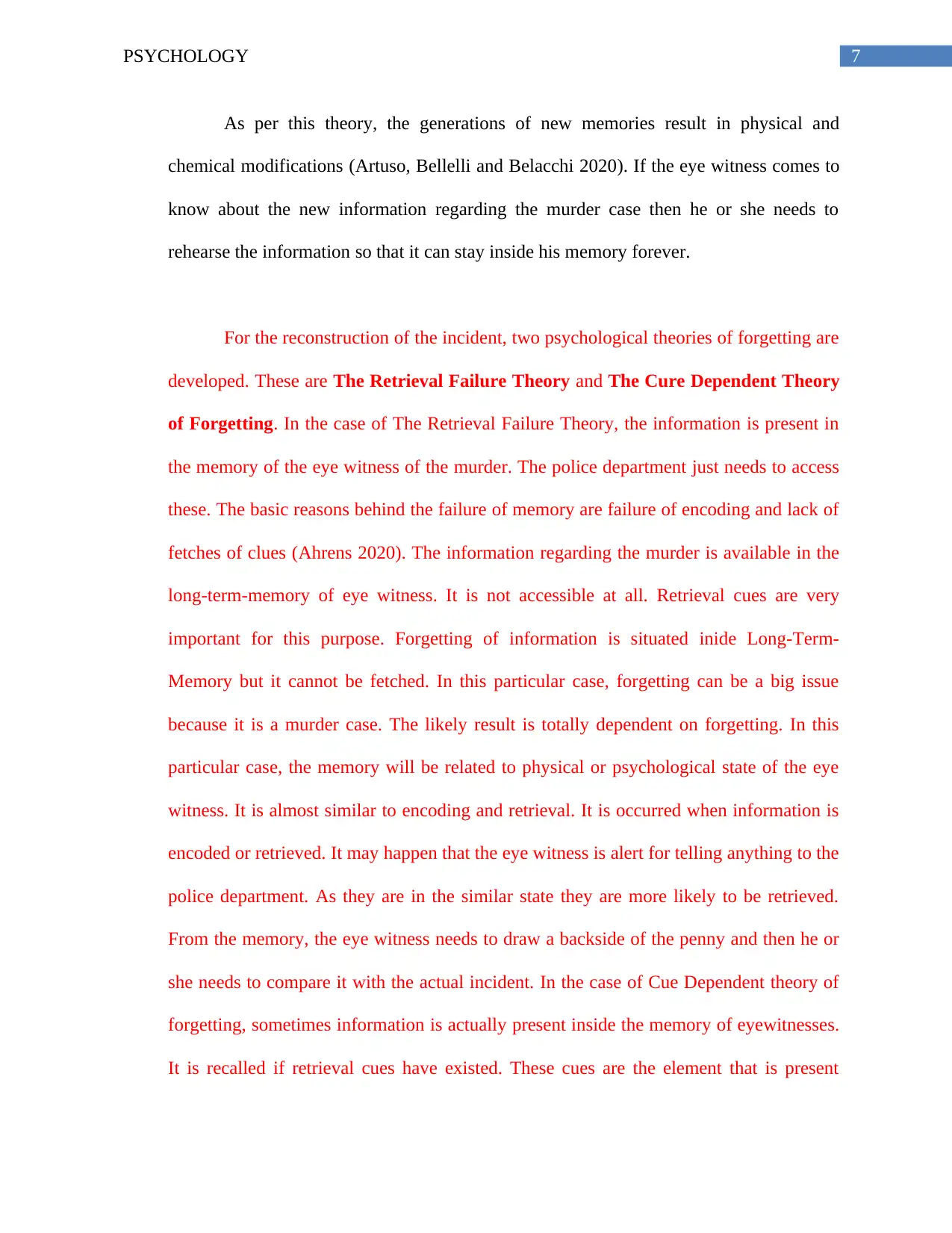
7PSYCHOLOGY
As per this theory, the generations of new memories result in physical and
chemical modifications (Artuso, Bellelli and Belacchi 2020). If the eye witness comes to
know about the new information regarding the murder case then he or she needs to
rehearse the information so that it can stay inside his memory forever.
For the reconstruction of the incident, two psychological theories of forgetting are
developed. These are The Retrieval Failure Theory and The Cure Dependent Theory
of Forgetting. In the case of The Retrieval Failure Theory, the information is present in
the memory of the eye witness of the murder. The police department just needs to access
these. The basic reasons behind the failure of memory are failure of encoding and lack of
fetches of clues (Ahrens 2020). The information regarding the murder is available in the
long-term-memory of eye witness. It is not accessible at all. Retrieval cues are very
important for this purpose. Forgetting of information is situated inide Long-Term-
Memory but it cannot be fetched. In this particular case, forgetting can be a big issue
because it is a murder case. The likely result is totally dependent on forgetting. In this
particular case, the memory will be related to physical or psychological state of the eye
witness. It is almost similar to encoding and retrieval. It is occurred when information is
encoded or retrieved. It may happen that the eye witness is alert for telling anything to the
police department. As they are in the similar state they are more likely to be retrieved.
From the memory, the eye witness needs to draw a backside of the penny and then he or
she needs to compare it with the actual incident. In the case of Cue Dependent theory of
forgetting, sometimes information is actually present inside the memory of eyewitnesses.
It is recalled if retrieval cues have existed. These cues are the element that is present
As per this theory, the generations of new memories result in physical and
chemical modifications (Artuso, Bellelli and Belacchi 2020). If the eye witness comes to
know about the new information regarding the murder case then he or she needs to
rehearse the information so that it can stay inside his memory forever.
For the reconstruction of the incident, two psychological theories of forgetting are
developed. These are The Retrieval Failure Theory and The Cure Dependent Theory
of Forgetting. In the case of The Retrieval Failure Theory, the information is present in
the memory of the eye witness of the murder. The police department just needs to access
these. The basic reasons behind the failure of memory are failure of encoding and lack of
fetches of clues (Ahrens 2020). The information regarding the murder is available in the
long-term-memory of eye witness. It is not accessible at all. Retrieval cues are very
important for this purpose. Forgetting of information is situated inide Long-Term-
Memory but it cannot be fetched. In this particular case, forgetting can be a big issue
because it is a murder case. The likely result is totally dependent on forgetting. In this
particular case, the memory will be related to physical or psychological state of the eye
witness. It is almost similar to encoding and retrieval. It is occurred when information is
encoded or retrieved. It may happen that the eye witness is alert for telling anything to the
police department. As they are in the similar state they are more likely to be retrieved.
From the memory, the eye witness needs to draw a backside of the penny and then he or
she needs to compare it with the actual incident. In the case of Cue Dependent theory of
forgetting, sometimes information is actually present inside the memory of eyewitnesses.
It is recalled if retrieval cues have existed. These cues are the element that is present
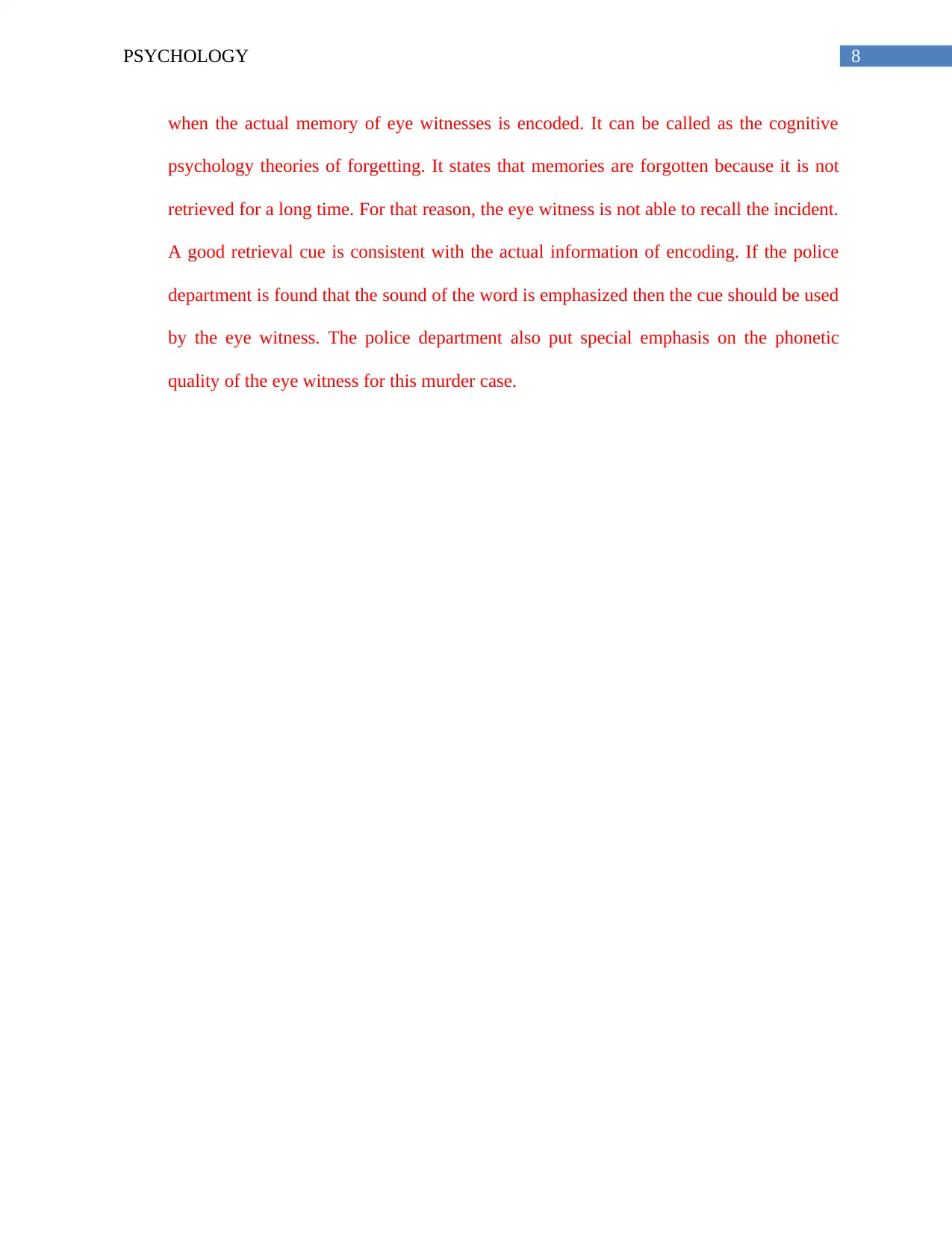
8PSYCHOLOGY
when the actual memory of eye witnesses is encoded. It can be called as the cognitive
psychology theories of forgetting. It states that memories are forgotten because it is not
retrieved for a long time. For that reason, the eye witness is not able to recall the incident.
A good retrieval cue is consistent with the actual information of encoding. If the police
department is found that the sound of the word is emphasized then the cue should be used
by the eye witness. The police department also put special emphasis on the phonetic
quality of the eye witness for this murder case.
when the actual memory of eye witnesses is encoded. It can be called as the cognitive
psychology theories of forgetting. It states that memories are forgotten because it is not
retrieved for a long time. For that reason, the eye witness is not able to recall the incident.
A good retrieval cue is consistent with the actual information of encoding. If the police
department is found that the sound of the word is emphasized then the cue should be used
by the eye witness. The police department also put special emphasis on the phonetic
quality of the eye witness for this murder case.
⊘ This is a preview!⊘
Do you want full access?
Subscribe today to unlock all pages.

Trusted by 1+ million students worldwide
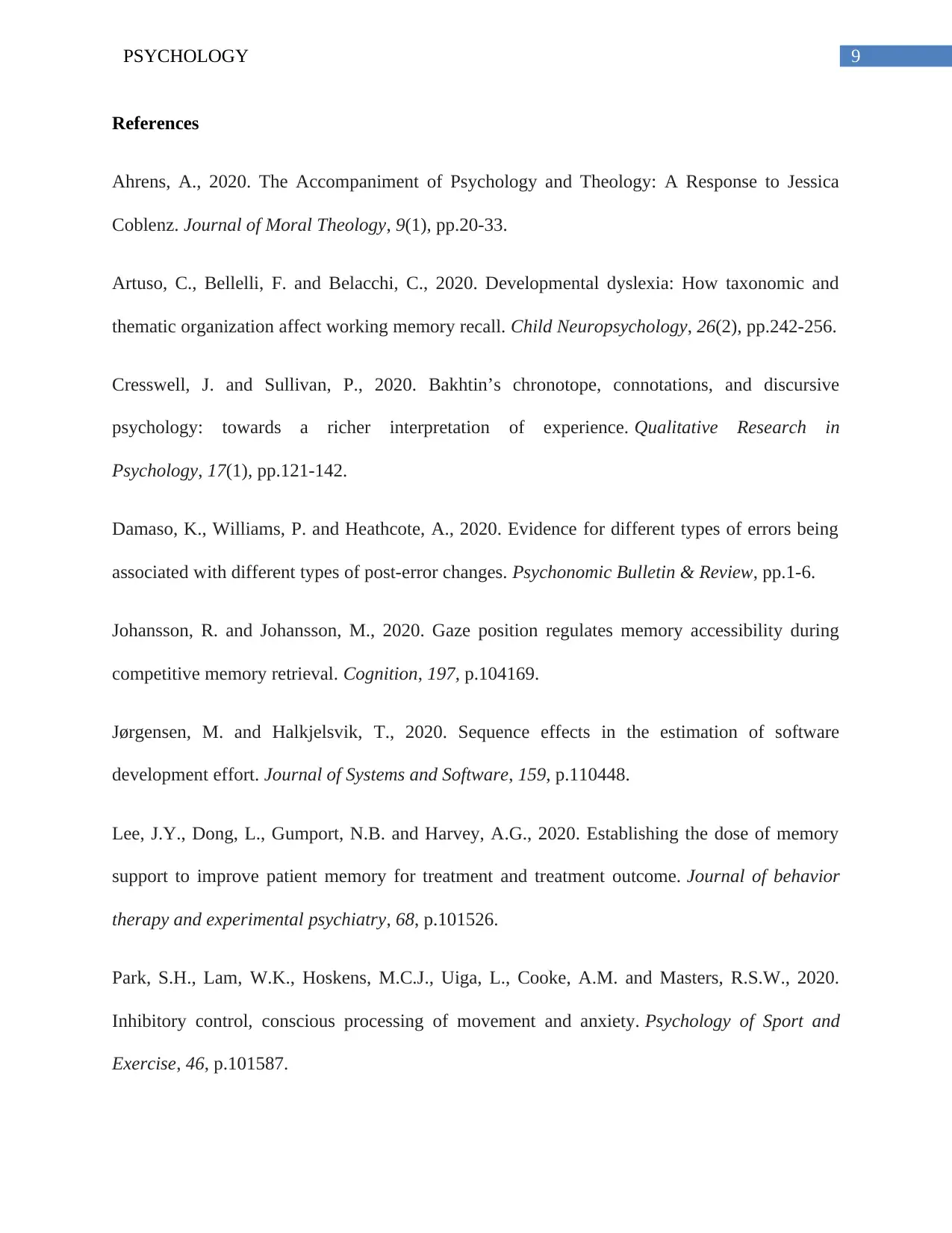
9PSYCHOLOGY
References
Ahrens, A., 2020. The Accompaniment of Psychology and Theology: A Response to Jessica
Coblenz. Journal of Moral Theology, 9(1), pp.20-33.
Artuso, C., Bellelli, F. and Belacchi, C., 2020. Developmental dyslexia: How taxonomic and
thematic organization affect working memory recall. Child Neuropsychology, 26(2), pp.242-256.
Cresswell, J. and Sullivan, P., 2020. Bakhtin’s chronotope, connotations, and discursive
psychology: towards a richer interpretation of experience. Qualitative Research in
Psychology, 17(1), pp.121-142.
Damaso, K., Williams, P. and Heathcote, A., 2020. Evidence for different types of errors being
associated with different types of post-error changes. Psychonomic Bulletin & Review, pp.1-6.
Johansson, R. and Johansson, M., 2020. Gaze position regulates memory accessibility during
competitive memory retrieval. Cognition, 197, p.104169.
Jørgensen, M. and Halkjelsvik, T., 2020. Sequence effects in the estimation of software
development effort. Journal of Systems and Software, 159, p.110448.
Lee, J.Y., Dong, L., Gumport, N.B. and Harvey, A.G., 2020. Establishing the dose of memory
support to improve patient memory for treatment and treatment outcome. Journal of behavior
therapy and experimental psychiatry, 68, p.101526.
Park, S.H., Lam, W.K., Hoskens, M.C.J., Uiga, L., Cooke, A.M. and Masters, R.S.W., 2020.
Inhibitory control, conscious processing of movement and anxiety. Psychology of Sport and
Exercise, 46, p.101587.
References
Ahrens, A., 2020. The Accompaniment of Psychology and Theology: A Response to Jessica
Coblenz. Journal of Moral Theology, 9(1), pp.20-33.
Artuso, C., Bellelli, F. and Belacchi, C., 2020. Developmental dyslexia: How taxonomic and
thematic organization affect working memory recall. Child Neuropsychology, 26(2), pp.242-256.
Cresswell, J. and Sullivan, P., 2020. Bakhtin’s chronotope, connotations, and discursive
psychology: towards a richer interpretation of experience. Qualitative Research in
Psychology, 17(1), pp.121-142.
Damaso, K., Williams, P. and Heathcote, A., 2020. Evidence for different types of errors being
associated with different types of post-error changes. Psychonomic Bulletin & Review, pp.1-6.
Johansson, R. and Johansson, M., 2020. Gaze position regulates memory accessibility during
competitive memory retrieval. Cognition, 197, p.104169.
Jørgensen, M. and Halkjelsvik, T., 2020. Sequence effects in the estimation of software
development effort. Journal of Systems and Software, 159, p.110448.
Lee, J.Y., Dong, L., Gumport, N.B. and Harvey, A.G., 2020. Establishing the dose of memory
support to improve patient memory for treatment and treatment outcome. Journal of behavior
therapy and experimental psychiatry, 68, p.101526.
Park, S.H., Lam, W.K., Hoskens, M.C.J., Uiga, L., Cooke, A.M. and Masters, R.S.W., 2020.
Inhibitory control, conscious processing of movement and anxiety. Psychology of Sport and
Exercise, 46, p.101587.
Paraphrase This Document
Need a fresh take? Get an instant paraphrase of this document with our AI Paraphraser
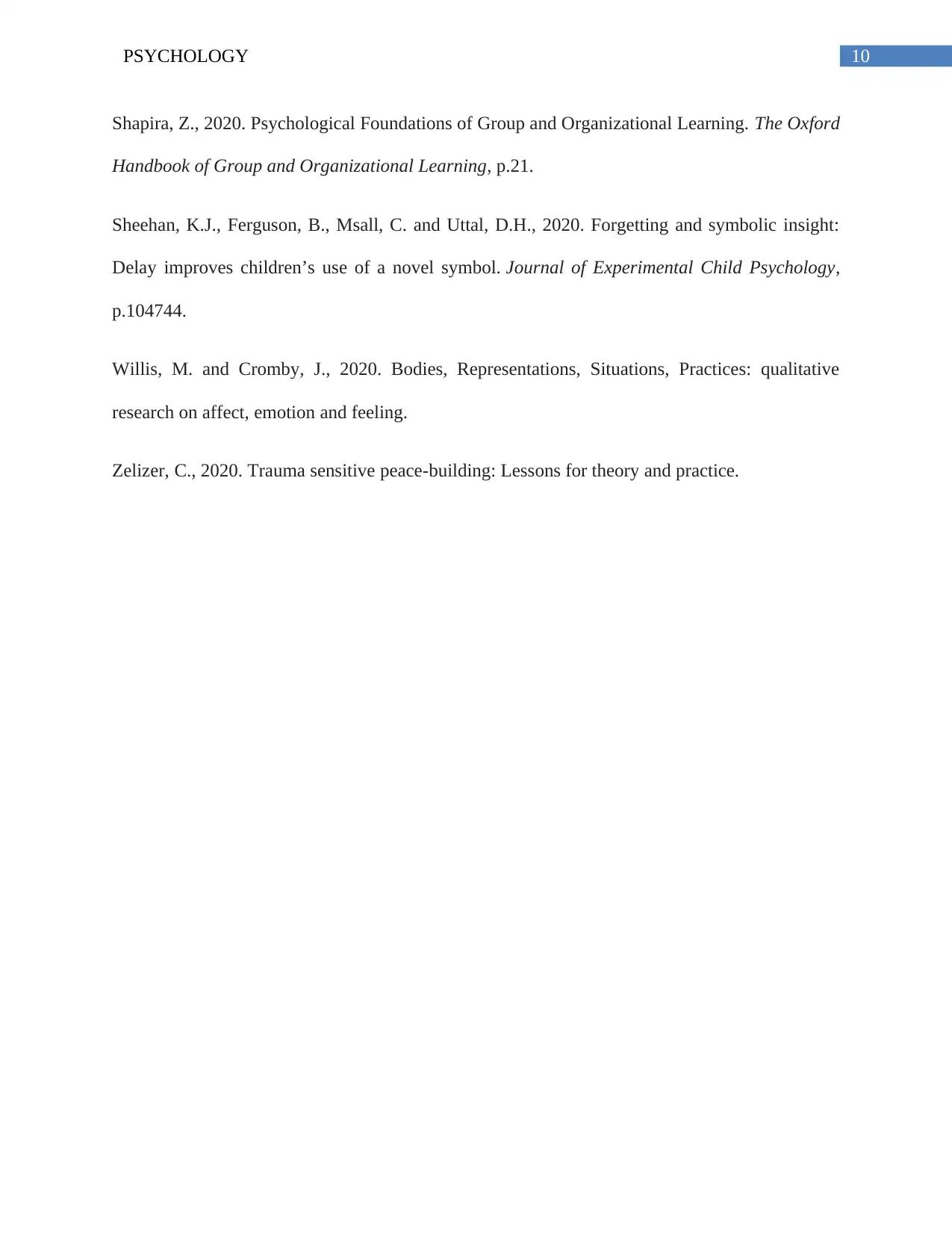
10PSYCHOLOGY
Shapira, Z., 2020. Psychological Foundations of Group and Organizational Learning. The Oxford
Handbook of Group and Organizational Learning, p.21.
Sheehan, K.J., Ferguson, B., Msall, C. and Uttal, D.H., 2020. Forgetting and symbolic insight:
Delay improves children’s use of a novel symbol. Journal of Experimental Child Psychology,
p.104744.
Willis, M. and Cromby, J., 2020. Bodies, Representations, Situations, Practices: qualitative
research on affect, emotion and feeling.
Zelizer, C., 2020. Trauma sensitive peace-building: Lessons for theory and practice.
Shapira, Z., 2020. Psychological Foundations of Group and Organizational Learning. The Oxford
Handbook of Group and Organizational Learning, p.21.
Sheehan, K.J., Ferguson, B., Msall, C. and Uttal, D.H., 2020. Forgetting and symbolic insight:
Delay improves children’s use of a novel symbol. Journal of Experimental Child Psychology,
p.104744.
Willis, M. and Cromby, J., 2020. Bodies, Representations, Situations, Practices: qualitative
research on affect, emotion and feeling.
Zelizer, C., 2020. Trauma sensitive peace-building: Lessons for theory and practice.
1 out of 11
Related Documents
Your All-in-One AI-Powered Toolkit for Academic Success.
+13062052269
info@desklib.com
Available 24*7 on WhatsApp / Email
![[object Object]](/_next/static/media/star-bottom.7253800d.svg)
Unlock your academic potential
Copyright © 2020–2026 A2Z Services. All Rights Reserved. Developed and managed by ZUCOL.





